- Home
- Lynne Connolly
Sinless (The Shaws) Page 4
Sinless (The Shaws) Read online
Page 4
“So you will leave Andrew Graham alone,” his father said gently. “He cannot break the law and uphold it at the same time.”
Darius disagreed. “Maybe some laws are unjust. Maybe they need to be changed.”
His father gave a harsh laugh and kept Darius pinned under his sharp stare. “Then become a member of Parliament and change them. Otherwise, you will have no say.”
Darius had refused a seat in the House, angering his father, who would have liked a son in the Commons. However, times had indeed changed.
Darius had a sense of fairness that daily was challenged. “Let me think of it further, sir. If I do decide to take the step, I want to be sure.”
His father nodded. “I will not press you, but I will be here if you require aid.”
His father had at least two Parliamentary seats in his pocket. Darius could enter Parliament if he wished to in a month or two.
“Is your personal situation changing your mind?”
“Yes.” Darius’s heart automatically hardened against what he knew to be his greatest vulnerability. He would not fall in love because he could not afford to. He refused, so it would not happen. How could he plunge into a situation that would imperil himself and everyone he knew? People did foolish things for love. Ergo, he, Darius Shaw, would not fall in love.
Unlike his siblings, if he fell in love he could end up on the gallows.
“I will not compromise Andrew Graham, sir.” He crossed one leg over the other, resting his ankle on his knee. “I intend to use what attraction there is between us to extract the information I want, though. Do you know any more information that will be of use?”
His father shook his head. “Only that there is a suspected nest of spies setting up on the outskirts of London society. The young man you were with last night has been definitely identified as Matteo Bartolini, an Italian working for France, but also reporting to the Vatican. I thought General Court would have the sense to let him be and follow his actions, rather than swoop on him. It appears I was wrong.”
“It was Court?”
The marquess nodded. “I believe so. I’ll know for sure later today if he precipitated that raid and he did it without informing his superiors.”
General Court worked in Whitehall, although he’d rather be in the field, planning battles. Everything he did, the contempt he frequently expressed about civilian life, spoke to that. He had interfered with the Emperors before.
Darius sighed. “I will pursue Bartolini. Today I plan to discover what Andrew Graham knows, but considering the service he did us last year, I will not—” He broke off abruptly. Even the thought of touching the man, kissing him, the very notion, sent his blood pounding through his body.
He could control the fever that threatened to race out of control. He would not fall in love and he would not take the matter further. If he promised his father now, used the words, he would stick to that. It would be his insurance.
Abruptly, he got to his feet and bowed. “I am expected at his house. He invited me to dinner. I’ll show myself around town, to assure people my exploits last night did not matter in the least, and then I’ll find out what Graham knows.”
His father gazed at him for a few seconds before he nodded. “Very well. Keep me apprised. I do not wish to lose any more threads of this particular tangle.”
Darius paused at the door when he heard his father say, “Do not get into trouble, my son. It would grieve me to lose you.”
“I swear, sir, I’ll take all the precautions I can.”
Chapter 4
Andrew toyed with his pen, the quill sliding through his fingers. Much though he tried to prevent it, his thoughts kept returning to the handsome, arrogant aristocrat he’d found in Newgate Gaol that morning. The intimacies of the encounter forced their way back into his brain every time he pushed them out. He could taste the other man, feel the hard body against his and the arms holding him firmly. Everything about the embrace was so different from a woman’s soft caresses. Except for the silky softness of Shaw’s lips, a startling contrast to his inert strength.
Andrew would not lie to himself. He loved it, loved the way Shaw felt under his hands, loved the masculine, spicy scent pushing its way past the stink of the cell. He had suppressed those feelings for so long he had persuaded himself they didn’t exist anymore. Now he could not.
He should not dream. He had work to do. Gazing down, he saw the lines of neatly scribed words, the black ink against creamy white paper. What did it matter? Lord Frobisher was pursuing a claim for five miles of marshland from his neighbor. Who cared about marshland? Lord Frobisher brought a case every few months, and he was one of Andrew’s best clients. But what was the point?
Not when Andrew had rediscovered the passions of his youth. He had put such concerns aside at Oxford. Working for his law degree had left him precious little free time. He was one of the students who’d worked and left university with a degree mainly because he needed it. Without it, he’d have had to stay in the family business. Now he was independent, wealthy by many people’s standards, including his family’s, and respectable.
Most of all respectable. He could not consider Darius Shaw as anything but a temporary inconvenience, a man who might help him out of his predicament with General Court. Nothing else. After they had cleared up that matter, they would never meet again.
A ludicrous sense of loss filled him with dismay. He had barely met the man. Shaw probably kissed Andrew out of a sense of devilry, daring him to do something about it. He seemed like a man dancing on a tightrope, or at the edge of a cliff, seemingly unaware of the chasm below him, but miraculously escaping his doom. One day he would meet his end, and the results would not be clean.
Lord Shaw was likely to end his life abroad. If he was lucky. The authorities here clamped down on activities like the ones at Mother Fleming’s, once it was put under their noses.
Giving up on work, he picked up his penknife and set to sharpening his quill. Once he had the nib finely carved, he started on the next one, which he’d sharpened only yesterday. But it gave him something to do, and the repetitive task would settle his mind.
Unfortunately most of his caseload was of the repetitive, tedious kind. But it paid well. Such cases funded this house and his office in chambers. Modest by the standards of the Shaw family and their noble relatives, but grander than anything Andrew had known before. What was more, he’d earned every penny of its price.
That had to mean something.
The doorbell clanged, the slightly off-key note making him wince, as it always did. He should buy another, but he doubted he would find one that suited him any better, and the seller would most likely think he was running mad. Nobody wanted a doorbell that chimed a precise pitch, surely.
A gentle tap on his door heralded the entrance of his manservant. He carried a card, the left corner turned down. Andrew did not need to know who waited for him. The man’s presence filled his house. “Show him in.”
As he spoke, the clock chimed the half-hour. He’d changed when he got back from Newgate and ordered his clothes fumigated, as he always did. He kept a special suit of clothes for the times he was forced to visit prisoners, which admittedly did not happen often. Fastidiously, he refused to allow the prison stink to permeate the house, and changed in a small room off the kitchen downstairs. The maid would clean it. Even the court stank. Because of that care, he had never contracted gaol fever, nor had he brought it home for anyone else to suffer.
A swish of expensive fabric told him Lord Darius had entered the room. Taking his time, Andrew got to his feet and lifted his head to meet his guest’s eyes. Familiarity had not accustomed him to the startling blue, nor to the intensity of expression he found in the cerulean depths.
He did not bow. “Welcome, my lord.”
“Darius,” the man said. “My name is Darius. I prefer that my friends use it.”
“Andrew,” he responded numbly, wondering if he’d somehow been manipulated. Did Darius
mean what he said, or was he trying to bring them closer together? He had no way of knowing, but he could not afford to allow the man too close.
Too late now. He’d allowed the intimacy of using first names.
Darius acknowledged the word with a brief nod.
Andrew came around the desk. “Please come upstairs. I let time run away with me, I’m afraid, or I would have been waiting for you in the drawing room.”
Darius glanced around. “I like it here. It reminds me of my father’s study.” He turned to follow Andrew out of the room. “He chooses the smallest most unobtrusive room he can find and makes it his own. At home in the country he has his study close to the library, but if you did not know it was there, you would walk straight past it.”
“It sounds perfect.” Andrew would love a place to hide away like that. An office where he could be sure nobody would disturb him.
“You sighed.”
Andrew opened the door and bowed Darius through. He raised a brow, smiling, and accepted the courtesy. “I did,” he said, closing the door carefully. “I am constantly in danger of interruption. That is all.”
“I imagine your life is full.”
“You could say that.” He had certainly done his best to fill it. That way he didn’t think about matters he should not. He found closing the shutters on his thoughts easier. Except when this man was close to him. Why should an arrogant lord touch him more than any other man had for years? Remind him of what he’d turned his back on so long ago?
He moved away from the enclosed space before the door into the wider area beyond. “I work downstairs and receive many of my visitors here. But I have been called to the Bar, and for that I have chambers in the Inns of Court.”
Footsteps behind him told Andrew his guest was following him across the black-and-white tiled hall. “You don’t seem to work as a barrister as often.”
Planting his foot on the bottom step, Andrew paused. “No, I do not. I was young and idealistic when I worked to take silk. To be truthful, my lord, there is little money to be made at the Bar. I wished to make a difference, or so I thought, and to take a hand in affecting the laws of our country. Precedence and case study are made at the Bar, for the most part. However,” he continued briskly, “I soon discovered the more lucrative practice of acting as a solicitor.”
They had reached the top of the stairs. Andrew led the way into the dining room.
The maids had already set the table. It appeared very fine to his critical eye, with silver cutlery and shining crystal glasses. Aware his guest would probably take such displays for granted and be faced with far more lavish displays, Andrew nevertheless refused to apologize. “We may start in the drawing room if you wish, but dinner is nearly ready and we are alone tonight.” He had considered inviting someone else, if only to break the tense atmosphere, but that could not happen, with the topics they needed to discuss.
“Good,” Darius responded tersely.
Was he feeling it too? Andrew thought not. He suspected the kiss at the brothel had been to provoke rather than arouse. Or to distract. If he thought of the event that way, he would not go further than he should. Not be tempted. “I have asked the maids to serve us then leave us alone. We have much of a delicate nature to discuss. The fewer people who know of our meeting, the better.”
Too late, he recalled the other meaning. A private meeting, clandestinely held, could mean more than conversation. “I trust my servants,” he added. “The clerk has gone home, and I have the cook, a manservant, and three maidservants on the premises.”
“My goodness.” Darius paused in the act of drawing back a chair. “You do live in a cozy manner.”
Andrew shrugged. “We need no more.”
“My mother has two maids merely devoted to her clothes and presenting her creditably. I am not precisely sure how many servants we have on the premises, but the hall always contains at least two manservants, including a liveried footman.” His mouth tilted in a grin that lit his eyes from the inside. “The hall boy is there at night, of course. My brother and I frequently played tricks on the poor individual. It was not fair of us, but young men with more money than sense will kick up their heels.”
“I wouldn’t know.” Andrew took his own seat. He had ordered the table set with places opposite one another. Too late he discovered his mistake. Meeting Darius’s eyes was inevitable, creating an intimacy he desperately did not want.
“Of course not.” Darius shook out his napkin as a maid tapped at the door, and brought in two dishes. Another followed, and then his footman. One course, six removes. Andrew rarely bothered with a formal serving when on his own, but he would call this a neat dinner. He would not apologize for his inadequacies.
The maids placed the dishes on the table with only slight tremors revealing their nervousness. Andrew dismissed them with a smile and a word of thanks. “We will serve ourselves.” After the servants left, he turned to Darius. “If you cannot serve yourself, I will of course help you.”
Darius burst into laughter, a little high-pitched, Andrew thought. “Do you think I am so incapable?”
“I have known it to happen. A certain duke, for instance, on a London Guildhall dinner, did not appear to know how to pick up his knife and fork until his servant placed them in his hands.”
Darius grinned. “I can guess who that was. My brother’s father-in-law. He knows perfectly well how to serve himself, but he believes the task below his dignity.”
“Goodness!” Andrew hadn’t considered that possibility. “The event was the talk of the City for weeks. It did not improve our opinions of the people who live in Mayfair.”
“I would imagine not.” Darius lifted the lid of the dish nearest to him and inhaled deeply. “That is a beautiful joint of beef.”
“I believe in living well.” Now he could afford it. “Time was that joint would have lasted me a week.”
Darius paused in the act of neatly transferring a couple of slices of beef to his plate. “I know very little about you, Andrew. I would love to know more.”
“Because you want the advantage in our discussions?”
“Because I like you.”
The words, spoken softly, pierced Andrew with the intensity of a penny whistle blasted next to his ear. Startled, he looked up and met Darius’s eyes.
He saw more than like in the blue depths. Emotions he dared not broach, dared not even mention. “That is good to know.” He prided himself on his ability to hide his emotions. This time, so close, with the man he couldn’t put out of his mind in his home, he could not conceal them immediately.
“And you like me,” Darius said.
“I wouldn’t go that far.” He tried to make his comment into a light joke, but he feared he’d failed. In a desperate effort to change the tenor of the conversation, he went back to Darius’s question. “I was not born into wealth. My father was a draper and a member of a Guild. My uncles still run the business, but it is not as lucrative as people imagine. The Drapers’ Guild is a wealthy one, but that is mainly because of the plethora of businesses in it rather than a few powerful individuals.”
“You have always lived in London, then?”
Andrew talked while he helped himself to some beef, and then the carrots and peas that lay temptingly in another dish. That way he didn’t have to look at the man and torture himself further. “I rarely travel beyond its walls. I have ventured into the country to visit a client from time to time, but that is rarely necessary. This city is my home.” He glanced up. “I was born here. I’m the son of a draper.”
If that didn’t put off the son of a marquess, nothing would. They kept their lines pure, occasionally injecting some hybrid vigor. Darius would not to want to associate with Andrew any more than was necessary now he knew his humble origins.
“Why did your brother come to me to defend him?” he asked abruptly.
“It wasn’t my brother who located you,” Darius said softly. “It was our cousin Julius who recommended you. I don’
t know why.”
Andrew recollected the sight of a sharp-featured man with piercing sapphire eyes. “Ah, yes. I did him a small service in a purchase of land. But why did he think me suitable for such a serious case?”
Darius shrugged. “Julius is a law unto himself. He rarely allows convention to affect his opinion. He must have seen something in you.”
“The case was not particularly difficult,” Andrew pointed out.
“But the stakes were high. The consequences if we lost were unthinkable.”
Andrew nodded. “They always are in murder cases.” Darius’s behavior had certainly cooled, which was, after all, what he wanted. He should feel easier, but he did not. This man disturbed him.
“The family is grateful to you.”
He didn’t want them grateful to him, least of all Darius. “I did a job I was well paid for.”
“And you did it so well,” Darius murmured. He forked up a helping of food.
“I’m gratified they think so.”
Darius swallowed and took a sip of wine before he continued. “It would do you no harm to appear in society.”
Andrew coughed, the shock of the calm statement jolting him out of what complacency he had left. Darius rose and came around to his side of the table, placing a hand on Andrew’s back, which did not help one bit. “Are you all right?”
He swallowed and regained his breath. “Fine,” he said, but his eyes were streaming, and he was forced to use his napkin to dry the tears of laughter. “I must have heard you wrong.”
“Which part?”
“The part about my moving in society. Do you really think they would welcome the son of a draper?”
Instead of returning to his side of the table, Darius leaned against it. He folded his arms, wrecking the line of his expensive dark red ribbed silk coat. This close, Andrew smelled the fresh soap used to clean it, together with the aroma he’d tried not to notice before—the spicy, musky scent that was unique to Darius.

 Boundless (The Shaws)
Boundless (The Shaws) Sinless (The Shaws)
Sinless (The Shaws) The Girl with the Pearl Pin
The Girl with the Pearl Pin Hosts to Ghosts Box Set
Hosts to Ghosts Box Set The Making of a Marquess
The Making of a Marquess Boundless
Boundless Beauty of Sunset
Beauty of Sunset Virginia And The Wolf
Virginia And The Wolf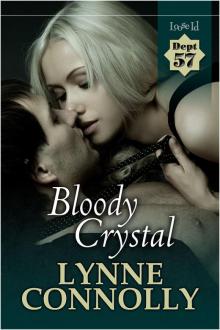 Department 57: Bloody Crystal
Department 57: Bloody Crystal Temptation Has Green Eyes
Temptation Has Green Eyes Forged by Love: Even Gods Fall in Love, Book 4
Forged by Love: Even Gods Fall in Love, Book 4 IntheMood
IntheMood Hareton Hall: Richard and Rose, Book 6
Hareton Hall: Richard and Rose, Book 6 ShiftingHeat
ShiftingHeat Rendezvous at Midnight
Rendezvous at Midnight Yorkshire: Richard and Rose, Book 1
Yorkshire: Richard and Rose, Book 1 Lisbon: Richard and Rose, Book 8
Lisbon: Richard and Rose, Book 8 Devonshire: Richard and Rose, Book 2
Devonshire: Richard and Rose, Book 2 Venice
Venice War Chest: Even Gods Fall in Love, Book 5
War Chest: Even Gods Fall in Love, Book 5 Dilemma in Yellow Silk (Emperors of London)
Dilemma in Yellow Silk (Emperors of London) BornontheBayou
BornontheBayou Dauntless (The Shaws)
Dauntless (The Shaws) Brutally Beautiful
Brutally Beautiful Lightning Unbound: Even Gods Fall in Love, Book 1
Lightning Unbound: Even Gods Fall in Love, Book 1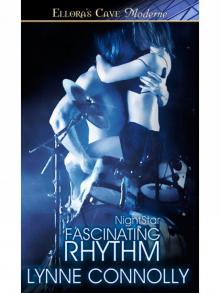 FascinatingRhythm
FascinatingRhythm Fearless
Fearless A Chance to Dream
A Chance to Dream Mad for Love: Even Gods Fall in Love, Book 2
Mad for Love: Even Gods Fall in Love, Book 2 Sinless
Sinless SailtotheMoon
SailtotheMoon Wild Lavender
Wild Lavender Department 57: Rubies of Fire
Department 57: Rubies of Fire Maiden Lane
Maiden Lane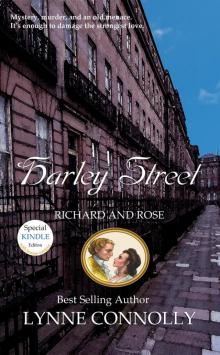 Harley Street
Harley Street Dauntless
Dauntless NicenEasy
NicenEasy It Started at Waterloo
It Started at Waterloo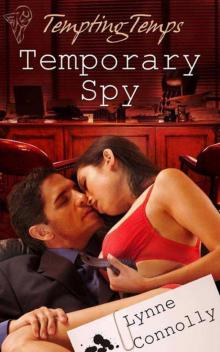 Temporary Spy
Temporary Spy BorntobeWild
BorntobeWild Dilemma in Yellow Silk
Dilemma in Yellow Silk Yorkshire
Yorkshire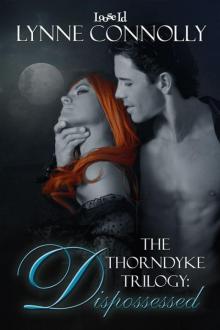 The Thorndykes 1: Dispossessed
The Thorndykes 1: Dispossessed The Thorndyke Trilogy 2: Dancing at Midnight
The Thorndyke Trilogy 2: Dancing at Midnight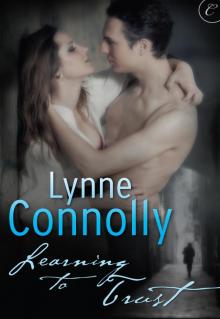 Learning to Trust
Learning to Trust Her Quicksilver Lover: Even Gods Fall in Love, Book 6
Her Quicksilver Lover: Even Gods Fall in Love, Book 6 Loving Lucy
Loving Lucy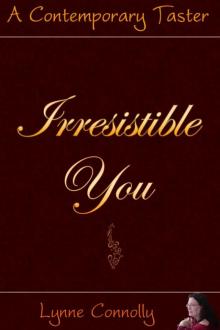 Irresistible You
Irresistible You Arrows of Desire: Even Gods Fall in Love, Book 3
Arrows of Desire: Even Gods Fall in Love, Book 3 Unbroken
Unbroken Devonshire
Devonshire Reckless in Pink
Reckless in Pink Rogue in Red Velvet
Rogue in Red Velvet